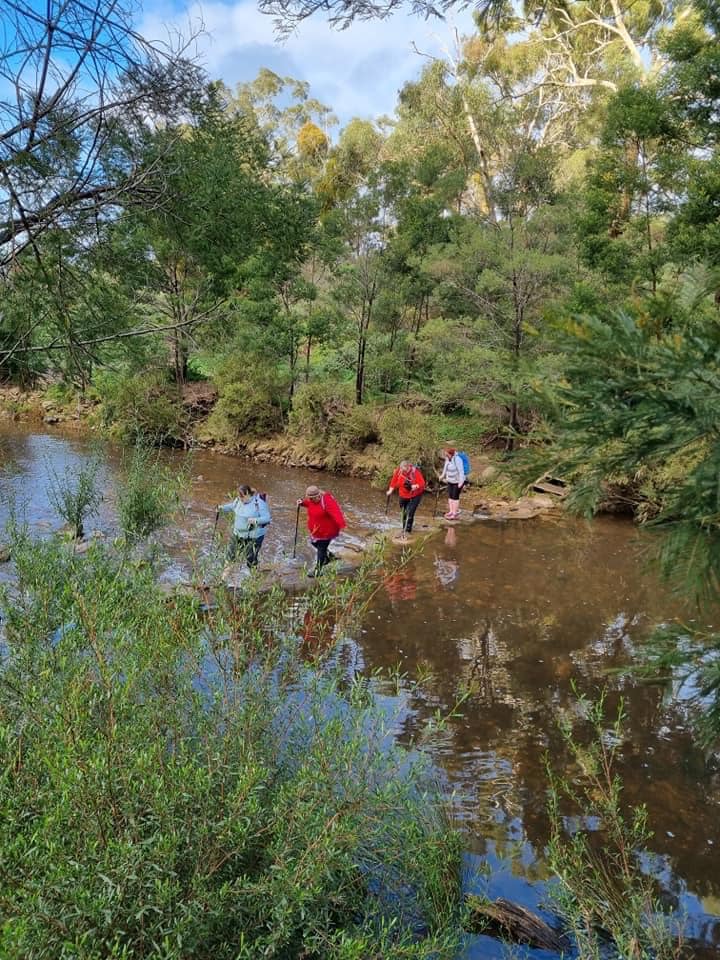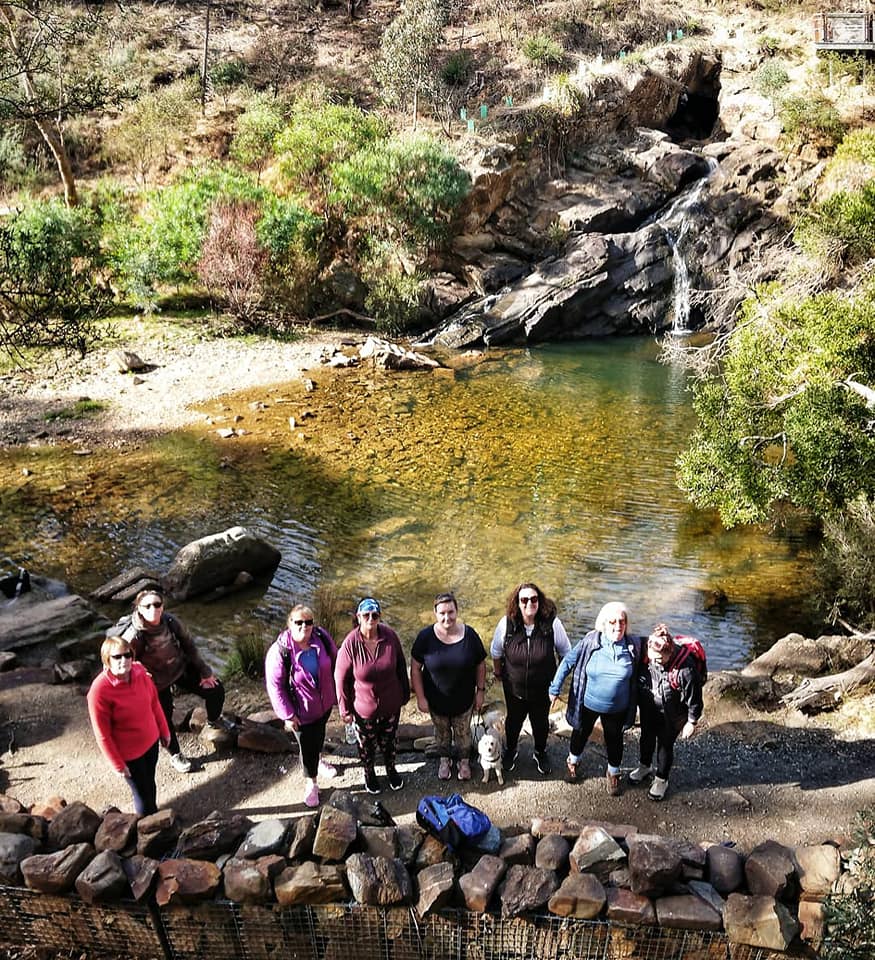ABOUT OUTDOOR HEALTH
Outdoor Health: Natural environments, Aboriginal & First Nations knowledge and human contact with nature
Outdoor Health is the term we use to encompass the range of evidence-informed nature-based health interventions being provided around Australia and internationally. Outdoor health research draws from a breadth of cross-disciplinary evidence bases.
Outdoor health practices activate ‘human contact with nature’ as an intentional setting, method or mechanism to support human health, wellbeing and healing.
With guidance from Aboriginal and First Nations knowledge holders, Outdoor health can benefit the health of natural environments alongside the health of people. Natural environments are often called ‘Country’ in Australia, in acknowledgement of the long and strong custodianship of land and sea by Aboriginal people.
Underlying Premises
- Humans are part of nature and are nature.
- Healthy natural environments are critical to human health and wellbeing.
- Indigenous communities and other place-based cultures managed to sustain both humans and natural environments concurrently, in some cases for millenia.
- The urbanisation of many societies, and associated developments, means that many people are more separated from nature and natural environments than at any other time in human history.
- Contact with nature, and time spent in nature, provides multiple benefits for humans.
- Nature and nature-based interventions offer an accessible place to strengthen and revitalise human health and wellbeing.
- Nature-contact offers a preventive approach that can help to sustain the health and wellbeing of whole populations.
- Nature-contact and nature-based interventions can strengthen the health of disadvantaged people and those at risk of health difficulties.
- Nature-contact and nature-based interventions can support those people whose health is ailing and who are in need of treatment and support.

Promising evidence
While the full scope and effects of nature-based interventions are yet to be synthesised, preliminary research demonstrates it is likely that nature-based interventions:
- can be used to support the health of humans across the lifespan, from infancy through childhood, and young adulthood to older adulthood
- can be used across the continuum of need, from prevention through early intervention, treatment or therapy, continuing care and palliative care
- can provide benefits across physical, mental, emotional, social, cultural, spiritual and ecological domains of human wellbeing
- can strengthen peoples’ bio-psycho-socio-ecological wellbeing
- can be delivered to individuals, couples, families, communities, peer groups and other target groups, and
- can provide effective treatment for people recovering from the effects of early life trauma or traumatic events, along with other targeted interventions, such as for those struggling with drug and alcohol misuse, mental ill health, a range of disabilities and relationship difficulties, to name a few examples.
ABOUT OUTDOOR HEALTH AUSTRALIA

Background
The Australian Association for Bush Adventure Therapy (AABAT) developed the term Outdoor Healthcare and Outdoor Health in consultation with Federal and State government representatives and a range of stakeholders prior to hosting the Eighth International Adventure Therapy Conference in 2018.
In 2018 AABAT established a voluntary Outdoor Health Policy Unit to engage with government so that more people may benefit from evidence-informed nature-based health practices. The Policy unit has worked to consolidate BAT as an evidence-informed health and wellbeing intervention, hosted national events, connected with proponents of other nature-based health modalities and national bodies, established an Outdoor Health Service Directory (under development), and begun to consolidate a national network of Outdoor Health researchers (under development).
In 2023, the AABAT membership voted to transition to a new entity structure and name ‘Outdoor Health Australia’ to better support the sector.
Purpose
There exists a strong and growing body of research that unequivocally identifies nature-contact as beneficial for human health, wellbeing and healing. This compliments the large evidence base behind guided therapy in the outdoors. Given this evidence, it is not surprising that wide-ranging health practitioners, organisations and sectors are embracing and applying the known benefits of nature-contact for a range of targeted health needs.
While different nature-based interventions may be quite distinct in terms of application, target group and addressed need, they often draw on the same body of human-nature-health research evidence.
The increasing prevalence of health practices, interventions and methodologies that draw from this rich human-nature evidence provide the imperative for us to come together, and work together, to strengthen the effectiveness of our collective work.

Scope
For AABAT, Outdoor Health includes health practices, interventions and methodologies that both draw from, and contribute to, the extensive body of existing human-nature-health research.
Well over 30 forms of nature-based interventions are used in Australia and around the world. Examples include Adventure therapy, Animal-assisted therapies, Ecopsychology, Ecotherapy, Equine Therapy, Forest Therapy and Therapeutic horticulture, to name a few. Outdoor Counselling is now provided using a range of evidence-based psychotherapeutic approaches such as Narrative therapy and trauma-focused CBT, and being combined with techniques such as mindfulness in a range of nature-based health interventions. According to theoretical and empirical research, proponents of these modalities have adapted their approaches for wide-ranging target groups to great effect.
Bush Adventure Therapy (BAT) is an evidence-informed nature-based health intervention that mobilises the known benefits of four mechanisms of change to achieve therapeutic outcomes for those involved: 1. nature-contact, 2. social relationships, 3. physical activity, and 4. psychological care. Understood internationally as ‘adventure therapy’, BAT is currently used in Australia with wide-ranging target groups that include: Aboriginal men, women and families for health, youth for mental health treatment, women and child survivors of family violence, young people in out of home care, and police officers who are displaying early signs of trauma, to name a few examples (see aabat.org.au for more information).
Further examples of nature-contact being mobilised for human health and wellbeing include the emerging practice by General Practitioners of prescribing nature-contact for patients, the emerging practice of qualified counsellors taking clients out-of-doors for therapy, and the greening of curriculum and practices within psychology and social work.
Activities such as Forest Bathing and Nature-based Mindfulness, along with research in the area of Therapeutic Landscapes provide additional perspectives and deepen the existing human-nature-health evidence base.
Aspirations
Outdoor Health Australia is a way of connecting:
- the general public with nature-based health services,
- nature-based health providers with bodies of research evidence, and researchers with practitioners,
- nature-based health providers with government and funding bodies.
AABAT’s Outdoor Health Policy Unit identified the following list of aspirations, to be refined with collaborating partners over time:
- Connect existing nature-based health providers, including practitioners, organisations, communities of practice, networks, forums, associations and representative bodies.
- Facilitate innovation forums to share knowledge, resources and efforts amongst nature-based researchers, practitioners, managers and policy makers.
- Develop collaborative research alliances to build a connected and coherent evidence base .
- Support training, quality assurance, accreditation and self regulation to support safe and effective practices.
- Explore the merits of establishing a national representative body prepared to advise government in relation to policies and programs that reflect the benefits of ‘Nature for health’.
- Advocate for government-funded research and intervention trials to support the translation of human-nature-health research into effective health interventions.
- Establish a legitimate role, and appropriate funding, for evidence-informed nature-based health interventions, and build understanding across all levels of government about the affordability, accessibility and efficacy of nature-based interventions.
